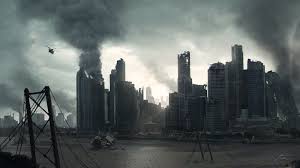The Destruction of Babylon
and the Restoration of Isra’el
50: 11-24
The destruction of Babylon and the restoration of Isra’el DIG: How do we know that the context of this message is in the far eschatological future? When did Babylon become a dry land, never to be inhabited again, but will be completely desolate? What will the effect be on Isra’el (50:4-8 and 17-20)? Why will it be crucial that Isra’el seek the LORD?
REFLECT: Just because God uses a nation or a person to carry out His plan, does that mean YHVH is pleased with them? Can you think of any other instances where ADONAI uses bad people to accomplish His will? What do these incidents tell you about Ha’Shem’s power and plan?
These prophecies were made in 594-593 BC during the eleven-year reign of Zedekiah
This is the word ADONAI spoke [at the hand of] Yirmeyahu the prophet concerning far eschatological Babylon and the land of the Babylonians (50:1):
The Destruction of Babylon: This was the sin of the capital city of the antichrist: Because you rejoice and are glad over Isra’el’s downfall, you who pillage My inheritance (Isra’el), because you frolic like a heifer threshing grain and neigh like stallions. The punishment will come in the far eschatological future when your mother (the city of Babylon) will be greatly ashamed; she who gave you birth will be disgraced. She will be the least of the nations – a wilderness, a dry land, a desert: This only happens during the Messianic Kingdom. Because of ADONAI’s anger she will not be inhabited but will be completely desolate (see the commentary on Revelation, to see link click Er – Babylon Will Never Be Found Again). All who pass Babylon will be appalled; they will scoff because of all her wounds (50:11-13). This did not happen when Cyrus the Great took over the kingdom (Dani’el 5:31). In fact, under Persian rule, Babylon flourished as a center of art and education.
When the armies of the antichrist out of Babylon attack the Jews in Jerusalem, the sheep Gentiles of the Tribulation (see the commentary on Revelation Fc – The Sheep and the Goats) take the opportunity to destroy the capital city of the antichrist (see the commentary on Revelation Ej – They Will Make War Against the Lamb, But the Lamb Will Overcome Them). Take up your positions around Babylon, all you who draw the bow. Shoot at her! Spare no arrows, for she has sinned against the LORD (50:14).

Shout against her on every side! She surrenders, her towers fall, her walls are torn down. This is not a description of the fall of Babylon in 538 BC by Cyrus the Great. He captured Babylon without a fight (Dani’el 5). No towers fell. No walls were torn down (see Ez – A Message Against Babylon). This is the far eschatological future destruction of Babylon at the end of the Tribulation just before Messiah returns (see the commentary on Isaiah Kg – The Second Coming of Jesus Christ to Bozrah). Since this is the vengeance of ADONAI, take vengeance on her; do to her as she has done to others. Her food supply will be halted: Cut off from Babylon the sower, and the reaper with his sickle at harvest. Because of the sword of the oppressor let everyone return to their own people, let everyone (besides the Jews) flee to their own land (50:15-16).

The Restoration of Isra’el: First, there is a summary of Isra’el’s history of suffering. In figurative language, Isra’el is a scattered flock that lions have chased away. The first to devour them was the king of Assyria; the last to crush their bones was Nebuchadnezzar king of Babylon. But at that time that sheep-to-lion relationship will change and the LORD will restore the sheep to their rightful pasture. Therefore this is what ADONAI-Tzva’ot, the God of Isra’el says: I will punish (future tense) the king of Babylon and his land as I punished the king of Assyria (50:17-18). First the Assyrians crushed the northern kingdom of Isra’el in 722 BC (Second Kings 17:3-6), and were eventually punished. General Nebuchadnezzar defeated the last Assyrian king Ashur-uballit II in 610 BC. The Egyptians came to his aide; however, Pharaoh’s army was driven back by Nebuchadnezzar, the son of the Babylonian king. Once Egypt retreated, Assyria had no more allies and their dominance in the holy land was over. And even though Babylon fell to Cyrus 539 BC, the context here describes the far eschatological destruction of the rebuilt city of Babylon at the end of the Great Tribulation. Therefore, what the Babylonians did to the Assyrians will one day be done to them.
While Babylon will eventually be totally destroyed, God’s people Isra’el will eventually be totally restored. But I will bring Isra’el back to their own pasture, and they will graze on Carmel (Galilee) and Bashan (present day Golan Heights); their appetite will be satisfied on the hills of Ephraim (present day west bank of Jordan) and Gilead (present day east bank of Jordan) (50:19). This can only be fulfilled in the Messianic Kingdom.
In those days, at that time, declares ADONAI. When Jeremiah (under the direction of the Holy Spirit) uses the phrase in the days to come; the days are coming; in those days; in that day, at that time; or for the time will surely come, the context points either to the near historical future or the far eschatological future and which one should be used. This is the twenty-first of twenty-five times that Yirmeyahu uses one of these phrases. In those days, at that time a search will be made for Isra’el’s guilt, but there will be none, and for the sins of Judah, but none will be found, for I will forgive the remnant I spare (50:20). Some questions need to be asked. Does Isra’el have any guilt today? Yes! Does Isra’el have any sins today? Yes! So, the fulfillment of these passages could only take place in the far eschatological future in the closing days of the Great Tribulation when there will be a national regeneration of the remnant of Isra’el still alive at that time (see the commentary on Revelation Ev – The Basis for the Second Coming of Jesus Christ).
Babylon’s Hammer of Power Destroyed: Attack the land of Merathaim, which is a description of Babylon. Merathaim is a word that means double rebellion or double bitterness. It is a play on words (which Yirmeyahu liked to do). In Hebrew: Mat (pronounced Mut) Marratim (roll the double r), means the land of the bitter river. This was an area at the head of the Persian Gulf where the Tigris and Euphrates rivers meet. But here is where the play on words come in. The root mrh means to rebel or bitterness, and with the two rivers we get the meaning of double rebellion or double bitterness.303 And attack those who live in Pekod (50:21a). These were a people living in the southeastern part of Babylon, but the root pqd means punishment or to punish. Hence, the land of Pekod (paw-kod’) is the land of destruction.
Let’s focus on this desrcution for a moment. Judaism has three degrees of excommunication, though none is common today. The lightest, n’zifah, which is simply a rebuke, could be declared by one person and normally lasts seven days. An example of heziphah is found in First Timothy 5:1. The next, niddui, which means to cast out, usually requires three rabbis to declare; would last a minimum of thirty days and people were required to stay six feet from the rejected one. An example of this second type is found in 2 Thessalonians 3:14-15 and Titus 3:10. The most severe, cherem, means to be devoted to destruction. It was a ban of indefinite duration and meant the person would be put out of the Temple. The rest of the Jewish community considered someone under the cherem judgment to be dead and no communication, or any kind of relationship, could be carried on with that person whatsoever (In the Talmud see Mo’ed Katan 16a-17a, N’darim 7b, Pesachim 52a). For a family so poor as to allow their son to beg – begging charity was to be avoided as much as giving charity was to be practiced – being unsynagogued would have spelled utter disaster. This third type is found in First Corinthians 5:1-7 and Matthew 18:15-20. For messianic Jews today social ostracism by family and the Jewish community – that is being treated as if under the cherem judgment – sometimes occurs was when committing one’s life to Yeshua (Mattityahu 10:34-37 and Luke 14:26).304
The far eschatological Babylon will be devoted to destruction. In the context of holy war, everything captured in battle, the totality of the city, its inhabitants and their property belonged to YHVH, whose right it was to destroy it completely. And once it is destroyed, it becomes completely untouchable. That’s why when Achan took that which was devoted to destruction; he, his whole family and all his belongings became devoted to destruction (Joshua 7:22-25). What was true of Jericho (Joshua 6:18-19) will be true of Babylon (50:13). Pursue, kill and completely destroy them, declares the LORD, because they are devoted to destruction. Do everything I have commanded you. The noise of battle is in the land, the noise of great cherem destruction (50:21b-22)!
How [shocked], broken and shattered is the hammer of the whole earth (see the commentary on Isaiah Dn – The LORD Has Broken the Rod of the Wicked)! Babylon will conquer the whole earth during the Great Tribulation. The antichrist will do it and set up his capital in the rebuilt city of Babylon, which will be the hammer, the destroyer of other nations around the world. But then, the hammer itself will be destroyed. The world will be shocked. How desolate is Babylon among the nations that it once conquered (50:23).
This message concludes with an ironic address to Babylon. She had set out traps for others, but she herself will be suddenly and unexpectedly entrapped and captured by them. I set a trap for you, Babylon, and you were caught before you knew it. Then the reason for judgment is given: You were found and captured because you opposed ADONAI (50:24; also see 50:29).



Leave A Comment